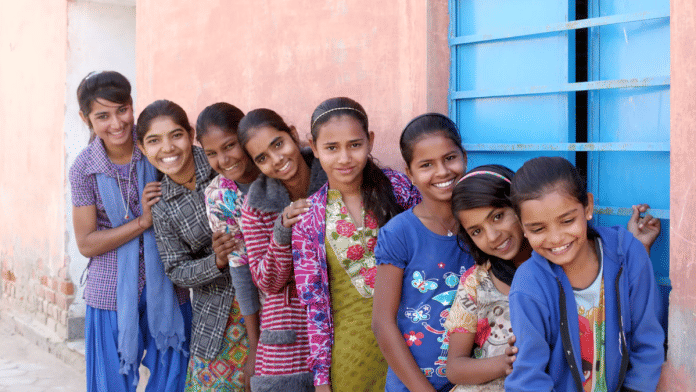Thank you dear subscribers, we are overwhelmed with your response.
Your Turn is a unique section from ThePrint featuring points of view from its subscribers. If you are a subscriber, have a point of view, please send it to us. If not, do subscribe here: https://theprint.in/subscribe/
Indian adolescents are navigating a complex landscape of academic pressure, rapid digitalization, high family expectations, and career uncertainties. One in seven Indian adolescents experiences mental health challenges resulting in increased instances depression, anxiety and stressed (Source– A 2024 National Mental health Survey). Development of psychological strength can manage thoughts, regulate emotions, and behave productively.
Psychological strength is a complex and multi-dimensional concept. We have defined it to consist of Gratitude, Resilience, Achievement-orientation, Positivity, Emotional intelligence, and a Sophophilic (knowledge-oriented) mindset – collectively called as GRAPES. Strengthening GRAPES can ensure adolescents not only survive, but also thrive, leading to a healthy and progressive society and nation.
Gratitude
Gratitude is a thankful appreciation for what an individual receives, both tangible and intangible. It shifts focus from scarcity to abundance enhancing contentment and motivation. Gratitude also helps people connect to something larger than themselves – to other people, nature, or a higher power and initiates a virtuous cycle. Individuals practicing daily gratitude journaling reported a 23% reduction in stress levels and a 17% improvement in sleep quality (Source- 2024- study by Indian Council of Medical Research).
Resilience
Resilience is the ability to withstand adversity and bounce back from failures. This is especially critical in India, where limited opportunities often lead to a higher rate of failures. Resilient individuals also experience stress and emotional upheaval but they manage and control such situations with focus, perseverance and grit. The resilience is not innate and can be systematically built through self-reflection and learning from setbacks, and with mentoring.
Achievement Orientation
The progress of humanity is primed by the passion to achieve something significant in life – to set lofty goals and accomplish them. Achievement orientation aligns efforts with purpose. It goes beyond mere academic grades. It includes taking calculated risks and persisting through challenges. It helps channelise energy towards goals. It requires embracing deep learning and seeing setbacks as opportunities for growth, rather than defining one’s worth.
Positivity
Positivity is the ability to identify opportunities within challenges, while acknowledging reality. It is the practice of focusing on the good in given situations and looking at setbacks as temporary. Positivity enables adolescents to reframe challenges, support creative problem-solving and have a positive impact on their physical and mental health. Individuals who engaged in positive self-talk and reframed negative experiences showed a 28% improvement in their perceived quality of life (Happiness Survey India (2024)).
Emotional Intelligence
Emotional Intelligence (EI) involves recognising, understanding, and managing emotions in oneself and others in positive ways to relieve stress, communicate effectively, empathize with others, and defuse conflict. It helps in handling interpersonal challenges and nurturing meaningful relationships, reducing isolation and increasing support systems during adversity. A 2023 NASSCOM Talent Report revealed that leaders with high EI outperformed their peers by 20% in managing team conflicts and building trust.
Sophophilic Mindset
A sophophilic mindset — or love for learning — goes beyond information gathering into developing wisdom. It expands perspectives and increases adaptability. It fosters curiosity, humility, and open-mindedness. An All India Survey on Higher Education report (2024) noted that students engaged in voluntary learning projects outside their curriculum, demonstrated 25% higher problem-solving skills and adaptability – the critical 21st century skills.
How can parents and others develop the GRAPES
The simplest way is they themselves live the above six dimensions. They can present and discuss case-studies of individuals – commoners and successful people – who have displayed these strengths. Developing GRAPES needs equal importance and attention as academics. Promote frank conversations with adolescents so that they can freely discuss feelings and challenges without fear of judgment. Inculcate the habit of ‘journaling’ in adolescents.
For gratitude, adolescents can regularly share things for which they are grateful with their near and dear ones. For resilience, adolescents must attempt solving problems themselves to the extent possible or with scaffolding from parents. They must learn to accept failures and parents must assure them that failures don’t define their worth. For achievement orientation, adolescents can be guided to set their missions and micro-goals aligned with it. They should be praised for their methods, not just the results; balancing process and goal orientation. Positivity can be inculcated by reframing challenges through self-evaluation and look at the silver lining. Emotional intelligence can be developed via reflective exercises and active debates. A sophophilic mindset can be cultivated by developing lifelong learning habits. This includes promoting reading and structured learning of new topics or areas, through real-life projects.
Conclusion:
In a rapidly evolving India, psychological strength will be a bridge between potential and realized achievements. By nurturing GRAPES, let us together build a society and country that is both materially and spiritually successful.
Author – Dr. Pradeep Waychal – Managing Trustee – Guruji Education Foundation
B Tech – COEP- Pune , M-Tech – IIT, Double PhD – IIT Mumbai and Delhi, MA –Phycology –IGNOU.
These pieces are being published as they have been received – they have not been edited/fact-checked by ThePrint.


